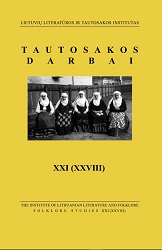APIE PASAKŲ SEKIMO YPATUMUS
REGARDING PECULIARITIES OF THE STORYTELLING
Author(s): Jūratė ŠlekonytėSubject(s): Cultural history, Customs / Folklore
Published by: Lietuvių literatūros ir tautosakos institutas
Keywords: Storytelling; folk tales and legends; folk tale performance; prohibition against telling tales;
Summary/Abstract: The article deals with the context of storytelling. The researcher concentrates upon the ethnographic material and texts of folk narratives of different genres (folk tales and legends), reflecting the folk tale performances. The following questions are discussed: who used to tell the tales and who were the listeners, when and why did the storytelling occur, how was it interpreted, and what kind of relationship was there between the storyteller and the listener? The comparative analysis of folklore (tales of lying, joke tales) and ethnographic material allowed drawing certain conclusions. Performance of tales used to be regarded as a serious matter. Ability of the folk tale personages to tell tales brought certain advantages to them: e.g., in the form of higher social status or material goods. The social promotion of a folk tale hero, i.e. marriage to the king’s daughter, directly depended upon his capacity to tell the tale. The same capacity could also have been a way of survival, determining whether or not the hero acquired the fire that he had set out to get. In the course of analysis it was pointed out that the listener is described in folklore as an elderly (old) person of a higher or highest social status (master, king). Whereas the person requested to tell the tale is described as a being of lower social status and / or younger age (shepherd, soldier). Such observation contradicts the common assertion that usually the elderly people tell tales to the younger ones. This contradiction supports an assumption of storytelling presenting a trial for a young person. The analysis of fairy tales supports this idea as well, because the initiators trying the heroes in the fairy tales are also characterized as older beings of higher social status (or of mythical character), if compared to the heroes undergoing the trial.
Journal: Tautosakos darbai
- Issue Year: 2005
- Issue No: 29
- Page Range: 86-99
- Page Count: 14
- Language: Lithuanian

